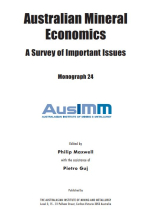Добрый день, Коллеги. Важное сообщение, просьба принять участие. Музей Ферсмана ищет помощь для реставрационных работ в помещении. Подробности по ссылке
Monograph 24. Australian mineral economics. A survey of important issues (AusIMM) / Монография 24. Экономика полезных ископаемых Австралии. Обзор важных вопросов
Economics, and the economic way of thinking, have had an important influence on business and government affairs for at least the last two centuries. The Scottish author Adam Smith espoused the foundations of modern economic thought in 1776 (Smith, 1976 [1776]). His famous volume – The Wealth of Nations1 – ushered in a revolution in economic thinking. His ideas formed the basis of the new academic field of political economy, which writers such as William Stanley Jevons renamed as economics some 100 years later.
In the early pages of his book, The Worldly Philosophers, Heilbroner (1972) traces the rise of economics to the emergence of the market system in the wake of the Industrial Revolution, which began in the middle of the 18th century. Prior to that time, the organisation and survival of society had largely depended on tradition and authoritarian rule.
The discipline of economics developed strongly during the 20th century, with economists applying its principles to many areas and industries. One of these industries was mining. For at least the last 50 years, undergraduate students in mining engineering programs around the world have taken one or more courses in mineral economics or engineering economics as part of their curriculum. Graduate coursework programs in mineral economics have also developed in a number of well-known universities.
As one might expect, mineral economics is ‘the application of economics in the study of all aspects of the mineral sector’ (MacKenzie, 1987, p 2). To understand its focus more clearly, however, it is necessary briefly to consider the definition of economics, and its evolution. <...>




